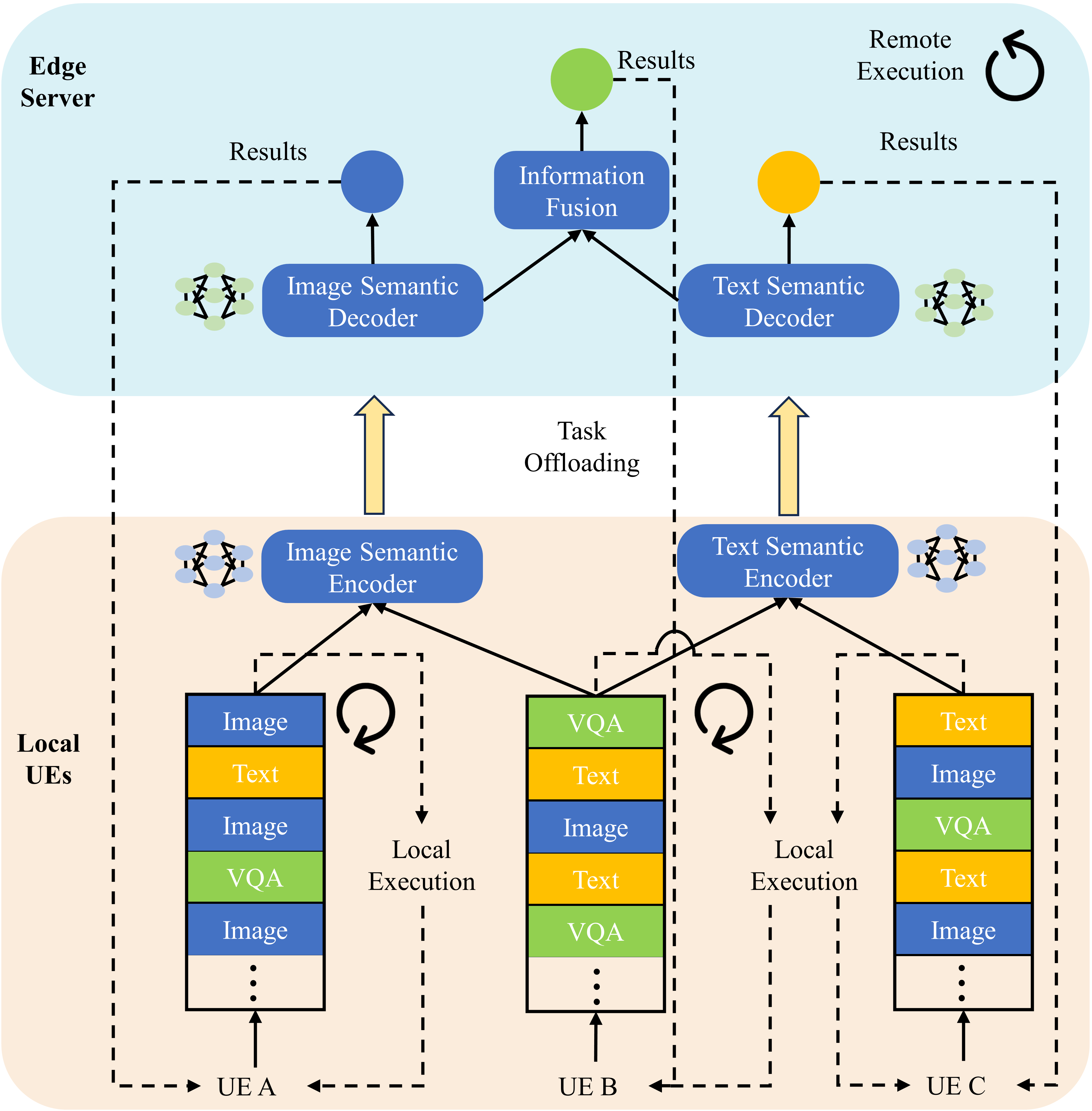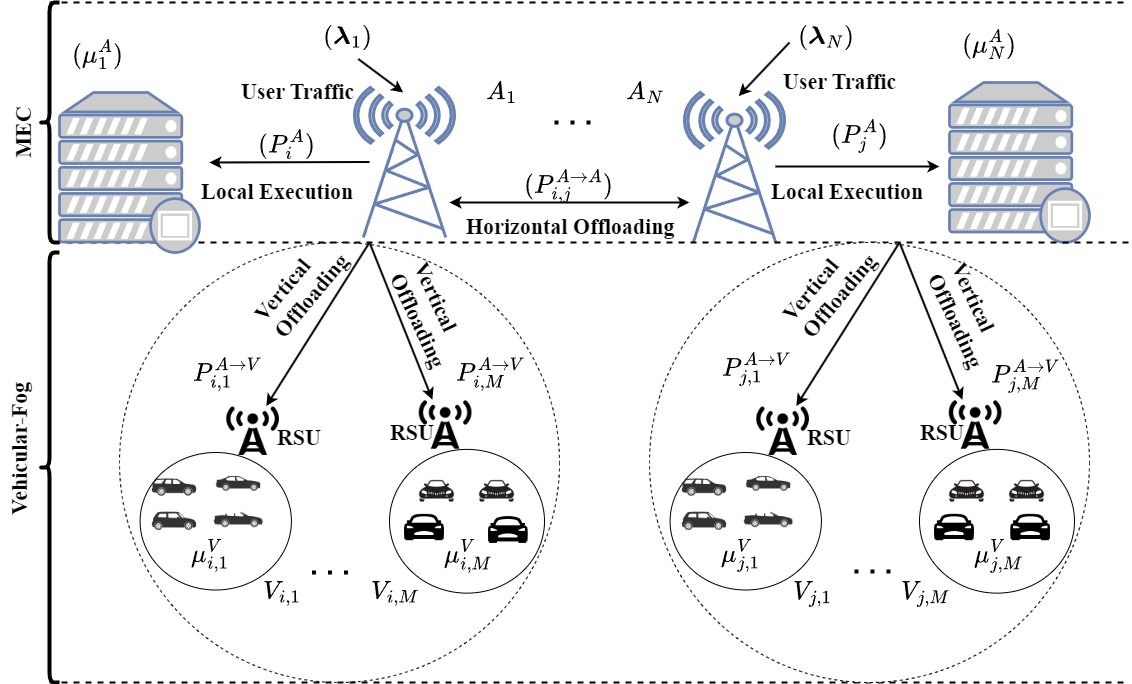Online Multi-Task Offloading for Semantic-Aware Edge Computing Systems

0

Sign in to get full access
Overview
- This paper proposes an online multi-task offloading framework for semantic-aware edge computing systems.
- The framework aims to optimize the completion ratio and latency of offloaded tasks while considering the semantic relationships between tasks.
- It leverages graph neural networks to model the semantic dependencies and makes real-time offloading decisions.
Plain English Explanation
In this paper, the researchers developed a system for managing the workload in edge computing environments. Edge computing refers to the use of small, geographically distributed computing devices, like smartphones or IoT sensors, to perform data processing and analysis closer to the source of the data. This can be more efficient than sending all the data to a central cloud server.
The key challenge the researchers wanted to address is how to decide which computing tasks should be processed locally on the edge device, and which should be offloaded to more powerful edge servers or the cloud. This decision needs to be made in real-time as new tasks arrive, and should consider the relationships between different tasks.
For example, if a task involves analyzing an image, there may be related tasks like object detection or scene classification that could be executed together to take advantage of shared computations. The researchers' framework uses graph neural networks to model these semantic relationships between tasks, and then makes offloading decisions to optimize the overall completion rate and latency of the tasks.
By considering the task semantics, the framework can make more informed decisions about which tasks to run where, leading to better performance compared to approaches that don't take the relationships between tasks into account. This is an important advancement for enabling efficient, responsive edge computing systems that can handle diverse, interdependent workloads.
Technical Explanation
The proposed online multi-task offloading framework [link to https://aimodels.fyi/papers/arxiv/multi-task-offloading-via-graph-neural-networks] leverages graph neural networks to model the semantic dependencies between tasks. The framework makes real-time offloading decisions to optimize the completion ratio and latency of the offloaded tasks.
The architecture consists of three key components:
- Semantic-Aware Task Modeling: A graph neural network is used to capture the semantic relationships between tasks. Each task is represented as a node in the graph, and the edges encode the semantic dependencies between them.
- Online Offloading Decision Making: Based on the task graph, the framework makes decisions about whether to execute each task locally on the edge device or to offload it to an edge server or the cloud. This decision is made in real-time as new tasks arrive.
- Resource Allocation: The framework also handles the allocation of computing resources (CPU, memory, etc.) to the offloaded tasks to ensure they can be executed efficiently.
The researchers conducted experiments to evaluate the performance of their framework compared to baseline approaches that did not consider task semantics. The results showed that their framework was able to achieve higher task completion ratios and lower latencies, especially for workloads with strong semantic dependencies between tasks.
Critical Analysis
The researchers have presented a compelling approach for enabling efficient edge computing by leveraging the semantic relationships between tasks. However, there are a few potential limitations and areas for further research:
-
Scalability: The paper does not discuss how the framework would scale to handle very large numbers of tasks and devices. As the system grows, the complexity of the task graph and the decision-making process may become a bottleneck.
-
Robustness: The framework assumes that the semantic relationships between tasks are known in advance and can be accurately modeled. In a real-world system, there may be uncertainty or changes in these relationships that the framework would need to be able to handle.
-
Energy Efficiency: While the framework optimizes for task completion ratio and latency, it does not explicitly consider the energy consumption of the edge devices and servers. This could be an important factor, especially for battery-powered IoT devices.
-
Heterogeneous Hardware: The current framework assumes homogeneous computing resources at the edge. In practice, edge devices may have varying capabilities, which could complicate the resource allocation process.
Despite these potential limitations, the researchers' approach represents an important step forward in enabling efficient and responsive edge computing systems that can handle complex, semantically-related workloads. Further research and real-world deployments will be necessary to address the challenges and fully realize the potential of this technology.
Conclusion
The online multi-task offloading framework proposed in this paper demonstrates how incorporating semantic awareness can improve the performance of edge computing systems. By modeling the relationships between tasks and making informed offloading decisions, the framework is able to achieve higher task completion ratios and lower latencies compared to approaches that do not consider task semantics.
This work highlights the importance of accounting for the inherent structure and dependencies in edge computing workloads, rather than treating tasks in isolation. As edge computing continues to play a growing role in areas like smart cities, autonomous vehicles, and industrial automation, techniques like the one presented in this paper will be crucial for enabling responsive, efficient, and intelligent edge-based systems.
This summary was produced with help from an AI and may contain inaccuracies - check out the links to read the original source documents!
Related Papers


0
Online Multi-Task Offloading for Semantic-Aware Edge Computing Systems
Xuyang Chen, Qu Luo, Gaojie Chen, Daquan Feng, Yao Sun
Mobile edge computing (MEC) provides low-latency offloading solutions for computationally intensive tasks, effectively improving the computing efficiency and battery life of mobile devices. However, for data-intensive tasks or scenarios with limited uplink bandwidth, network congestion might occur due to massive simultaneous offloading nodes, increasing transmission latency and affecting task performance. In this paper, we propose a semantic-aware multi-modal task offloading framework to address the challenges posed by limited uplink bandwidth. By introducing a semantic extraction factor, we balance the relationship among transmission latency, computation energy consumption, and task performance. To measure the offloading performance of multi-modal tasks, we design a unified and fair quality of experience (QoE) metric that includes execution latency, energy consumption, and task performance. Lastly, we formulate the optimization problem as a Markov decision process (MDP) and exploit the multi-agent proximal policy optimization (MAPPO) reinforcement learning algorithm to jointly optimize the semantic extraction factor, communication resources, and computing resources to maximize overall QoE. Experimental results show that the proposed method achieves a reduction in execution latency and energy consumption of 18.1% and 12.9%, respectively compared with the semantic-unaware approach. Moreover, the proposed approach can be easily extended to models with different user preferences.
Read more7/17/2024


0
Multi-Objective Offloading Optimization in MEC and Vehicular-Fog Systems: A Distributed-TD3 Approach
Frezer Guteta Wakgra, Binayak Kar, Seifu Birhanu Tadele, Shan-Hsiang Shen, Asif Uddin Khan
The emergence of 5G networks has enabled the deployment of a two-tier edge and vehicular-fog network. It comprises Multi-access Edge Computing (MEC) and Vehicular-Fogs (VFs), strategically positioned closer to Internet of Things (IoT) devices, reducing propagation latency compared to cloud-based solutions and ensuring satisfactory quality of service (QoS). However, during high-traffic events like concerts or athletic contests, MEC sites may face congestion and become overloaded. Utilizing offloading techniques, we can transfer computationally intensive tasks from resource-constrained devices to those with sufficient capacity, for accelerating tasks and extending device battery life. In this research, we consider offloading within a two-tier MEC and VF architecture, involving offloading from MEC to MEC and from MEC to VF. The primary objective is to minimize the average system cost, considering both latency and energy consumption. To achieve this goal, we formulate a multi-objective optimization problem aimed at minimizing latency and energy while considering given resource constraints. To facilitate decision-making for nearly optimal computational offloading, we design an equivalent reinforcement learning environment that accurately represents the network architecture and the formulated problem. To accomplish this, we propose a Distributed-TD3 (DTD3) approach, which builds on the TD3 algorithm. Extensive simulations, demonstrate that our strategy achieves faster convergence and higher efficiency compared to other benchmark solutions.
Read more4/22/2024
🔍

0
QECO: A QoE-Oriented Computation Offloading Algorithm based on Deep Reinforcement Learning for Mobile Edge Computing
Iman Rahmati, Hamed Shah-Mansouri, Ali Movaghar
In the realm of mobile edge computing (MEC), efficient computation task offloading plays a pivotal role in ensuring a seamless quality of experience (QoE) for users. Maintaining a high QoE is paramount in today's interconnected world, where users demand reliable services. This challenge stands as one of the most primary key factors contributing to handling dynamic and uncertain mobile environment. In this study, we delve into computation offloading in MEC systems, where strict task processing deadlines and energy constraints can adversely affect the system performance. We formulate the computation task offloading problem as a Markov decision process (MDP) to maximize the long-term QoE of each user individually. We propose a distributed QoE-oriented computation offloading (QECO) algorithm based on deep reinforcement learning (DRL) that empowers mobile devices to make their offloading decisions without requiring knowledge of decisions made by other devices. Through numerical studies, we evaluate the performance of QECO. Simulation results validate that QECO efficiently exploits the computational resources of edge nodes. Consequently, it can complete 14% more tasks and reduce task delay and energy consumption by 9% and 6%, respectively. These together contribute to a significant improvement of at least 37% in average QoE compared to an existing algorithm.
Read more8/16/2024


0
Koopman based trajectory model and computation offloading for high mobility paradigm in ISAC enabled IoT system
Minh-Tuan Tran
User experience on mobile devices is constrained by limited battery capacity and processing power, but 6G technology advancements are diving rapidly into mobile technical evolution. Mobile edge computing (MEC) offers a solution, offloading computationally intensive tasks to edge cloud servers, reducing battery drain compared to local processing. The upcoming integrated sensing and communication in mobile communication may improve the trajectory prediction and processing delays. This study proposes a greedy resource allocation optimization strategy for multi-user networks to minimize aggregate energy usage. Numerical results show potential improvement at 33% for every 1000 iteration. Addressing prediction model division and velocity accuracy issues is crucial for better results. A plan for further improvement and achieving objectives is outlined for the upcoming work phase.
Read more7/1/2024